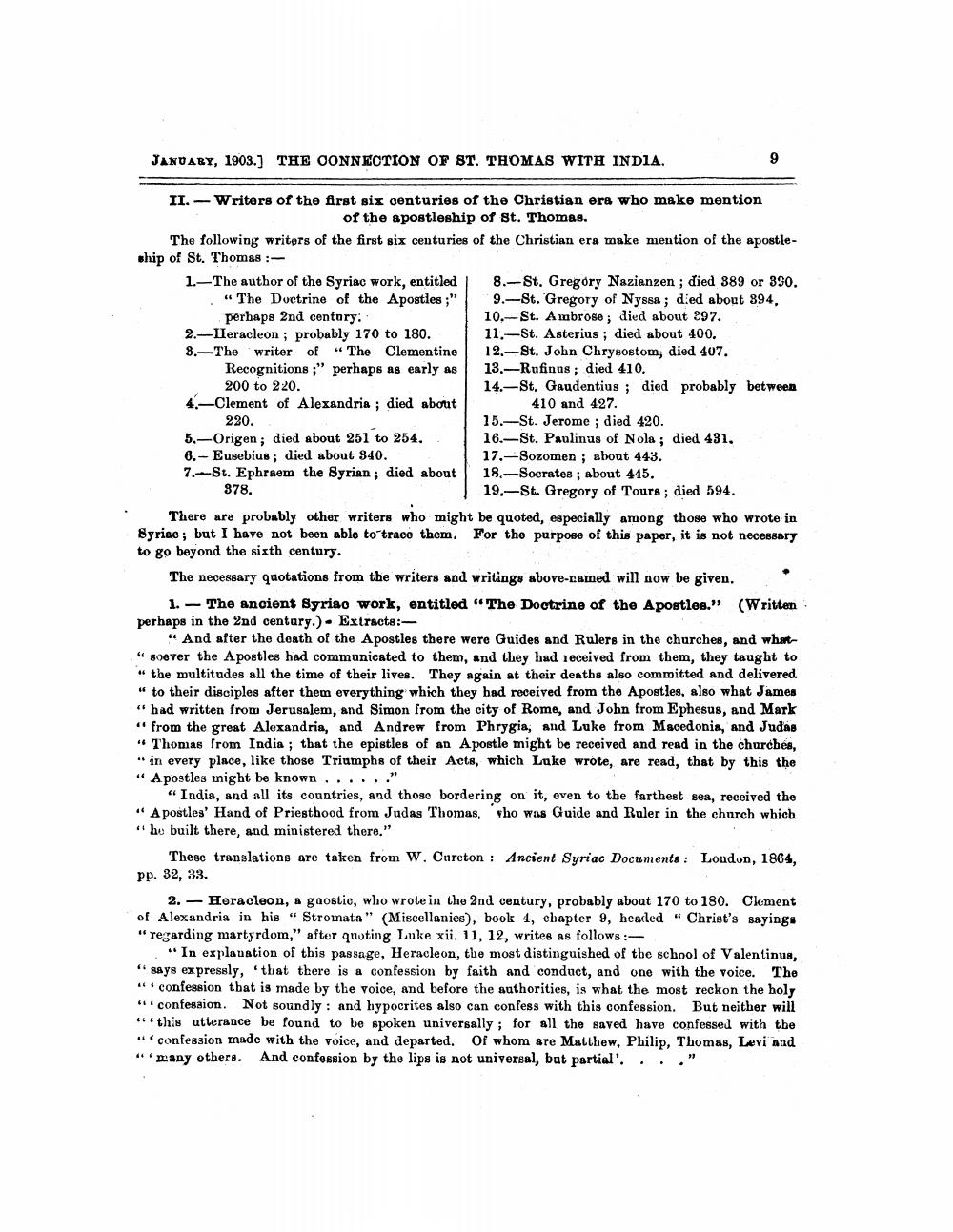________________
JANUARY, 1903.] THE CONNECTION OF ST. THOMAS WITH INDIA.
II. Writers of the first six centuries of the Christian era who make mention of the apostleship of St. Thomas.
The following writers of the first six centuries of the Christian era make mention of the apostleship of St. Thomas:
1. The author of the Syriac work, entitled "The Doctrine of the Apostles;" perhaps 2nd century:
2.-Heracleon; probably 170 to 180. 8. The writer of "The Clementine Recognitions;" perhaps as early as 200 to 220.
-Clement of Alexandria; died about 220.
5.-Origen; died about 251 to 254. 6.- Eusebius; died about 340.
7. St. Ephraem the Syrian; died about
878.
9
8. St. Gregory Nazianzen; died 389 or 390. 9.-St. Gregory of Nyssa; died about 394, 10. St. Ambrose; died about 297.
11. St. Asterius; died about 400.
12. St. John Chrysostom, died 407. 13. Rufinus; died 410.
14.-St. Gaudentius; died probably between
410 and 427.
15. St. Jerome; died 420.
16. St. Paulinus of Nola; died 431. 17.-Sozomen; about 443. 18.-Socrates; about 445.
19. St. Gregory of Tours; died 594.
There are probably other writers who might be quoted, especially among those who wrote in Syriac; but I have not been able to trace them. For the purpose of this paper, it is not necessary to go beyond the sixth century.
The necessary quotations from the writers and writings above-named will now be given.
1. The ancient Syriac work, entitled "The Doctrine of the Apostles." (Written perhaps in the 2nd century.) Extracts:
"And after the death of the Apostles there were Guides and Rulers in the churches, and what"soever the Apostles had communicated to them, and they had received from them, they taught to "the multitudes all the time of their lives. They again at their deaths also committed and delivered "to their disciples after them everything which they had received from the Apostles, also what James "had written from Jerusalem, and Simon from the city of Rome, and John from Ephesus, and Mark "from the great Alexandria, and Andrew from Phrygia, and Luke from Macedonia, and Judas "Thomas from India; that the epistles of an Apostle might be received and read in the churches, "in every place, like those Triumphs of their Acts, which Luke wrote, are read, that by this the "Apostles might be known. ...
"India, and all its countries, and those bordering on it, even to the farthest sea, received the "Apostles' Hand of Priesthood from Judas Thomas, who was Guide and Ruler in the church which "he built there, and ministered there."
These translations are taken from W. Cureton: Ancient Syriac Documents: London, 1864, pp. 32, 33.
2.- Heracleon, a gnostic, who wrote in the 2nd century, probably about 170 to 180. Clement of Alexandria in his "Stromata" (Miscellanies), book 4, chapter 9, headed "Christ's sayings "regarding martyrdom," after quoting Luke xii. 11, 12, writes as follows:
"In explanation of this passage, Heracleon, the most distinguished of the school of Valentinus, says expressly, that there is a confession by faith and conduct, and one with the voice. The "confession that is made by the voice, and before the authorities, is what the most reckon the holy "confession. Not soundly: and hypocrites also can confess with this confession. But neither will "this utterance be found to be spoken universally; for all the saved have confessed with the confession made with the voice, and departed. Of whom are Matthew, Philip, Thomas, Levi and many others. And confession by the lips is not universal, but partial'.




